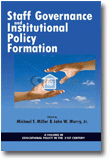
Staff Governance and Institutional Policy Formation
Edited by:
John W. Murray, University of Arkansas
Michael T. Miller, University of Arkansas
A volume in the series: Educational Policy in the 21st Century: Opportunities, Challenges and Solutions. Editor(s): Bruce Anthony Jones, University of Houston.
Published 2011
The number of staff members serving American higher education institutions has more than doubled in the past twenty years, as occupations in technology, development, government relations, and even athletic administration have grown as never before in the history of the academy. As the number, variety, and importance of these positions have grown, so has the need for their involvement in determining the direction and vision of the contemporary university. Often in opposition or cast in a competing light, staff governance bodies are positioned within the governance framework of faculty, students, trustees, and even legislatures, all bound together by formal and legal authority guidelines. The current volume is among the very first to explore this landscape, and begins with a critical evaluation of the context of how staff are involved in decision-making. The text devotes six chapters to an in-depth exploration of the environment where staff governance is used: in private and community colleges, with athletics and student affairs, in collective bargaining environments, and how the inclusion of staff can be an asset to institutional self-determination. The final section describes the array of topics staff governance bodies address, and shares a case study of one professional administrator who chaired a staff senate. The concluding chapter outlines the implications in policy formation, evaluation, and agenda setting for the involvement of staff in the higher education community. The book is a must read for new, senior college administrators, staff governance leaders, practitioners in human resource management, those concerned about democracy in education, and scholars studying higher education management.
CONTENTS
Foreword, Bruce Jones. Staff Governance: Trends, Issues, and the Practice of Shared Governance, John W. Murry, Jr. and Michael T. Miller. SECTION I: THE CONTEXT OF STAFF INVOLVEMENT. The Psychology of Inclusive Decision-Making, Kenda S. Grover, Kit Kacerik, and Julie J. Goldman. Legal Parameters of Authority Distributed to Staff, John W. Murry, Jr. Involvement of Multicultural Staff, Wanda M. Hadley. SECTION II: CONTEXTS OF STAFF INVOLVEMENT. Staff as Assets to Institution Building, E. Robert Mackey. The Role of Staff in the Decision-Making and Governance Policies in Private Colleges, Adam Morris and Tony Meyers. Staff Involvement in Governance and Policy Formation Internal and External to Student Affairs Organizations, Ashley Tull. Let’s Make a Deal: The Role of Staff Organization in Collective Bargaining and Decision-Making Processes, Randall Brumfield. SECTION III: IMPLICATIONS OF STAFF INVOLVEMENT. Trends and Issues Addressed in Staff Governance, Brent Burgess. Staff Senate: A Vice-Chair’s Case Study, Elizabeth S. Underwood. Institutional Policy Implications of Staff Involvement, Michael T. Miller.
-
Paperback978-1-61735-599-8
Web price: $45.04 (Reg. 52.99)
-
Hardcover978-1-61735-600-1
Web price: $80.74 (Reg. 94.99)
- eBook9781617356018

- EDU015000 - EDUCATION: Higher
- EDU001000 - EDUCATION: ADMINISTRATION: General
- EDU034000 - EDUCATION: EDUCATIONAL POLICY & REFORM: General
-
 College Student-Athletes
Challenges, Opportunities, and Policy Implications
College Student-Athletes
Challenges, Opportunities, and Policy Implications
-
 Contemporary Uses of Technology in K-12 Physical Education
Policy, Practice, and Advocacy
Contemporary Uses of Technology in K-12 Physical Education
Policy, Practice, and Advocacy
-
 Cultural Competence in America’s Schools
Leadership, Engagement and Understanding
Cultural Competence in America’s Schools
Leadership, Engagement and Understanding
-
 Leading Schools in Challenging Times
Eye to the Future
Leading Schools in Challenging Times
Eye to the Future
-
 Resiliency Reconsidered
Policy Implications of the Resiliency Movement
Resiliency Reconsidered
Policy Implications of the Resiliency Movement
-
 Tradition and Culture in the Millennium
Tribal Colleges and Universities
Tradition and Culture in the Millennium
Tribal Colleges and Universities
-
 Training Higher Education Policy Makers and Leaders
A Graduate Program Perspective
Training Higher Education Policy Makers and Leaders
A Graduate Program Perspective

